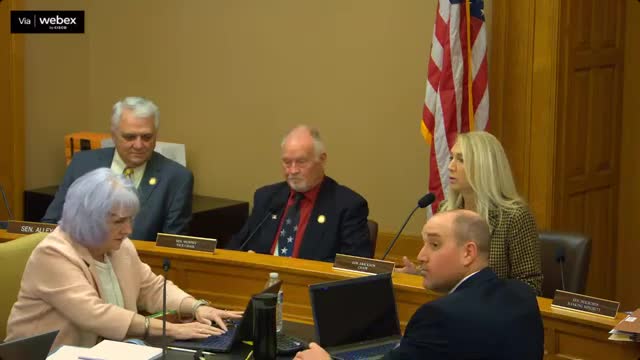Medicaid inspector general urges corrective-action plans after audits find millions in questionable payments
Get AI-powered insights, summaries, and transcripts
Subscribe
Summary
Steve Anderson, Kansas Medicaid Inspector General, told the Committee on Government Efficiency his office has identified program weaknesses and recommended corrective-action plans, follow-up audits and greater involvement in Medicaid contracting to recover savings and curb fraud.
Steve Anderson, Medicaid Inspector General, told the Committee on Government Efficiency that his office has identified ‘‘fraud, waste and abuse’’ in the state Medicaid program and urged the committee to require corrective-action plans and give his office more resources and access to contracting documents.
Anderson said the state Medicaid program is ‘‘a $5,500,000,000 program per year’’ that served an average of ‘‘467,440 beneficiaries in a year,’’ and that his small office has produced audits that together contain 34 findings and 83 recommendations since 2021.
Anderson told the committee the office needs both more staff and formal mechanisms to force follow-up when agencies do not act on audit recommendations. ‘‘When we do an audit … sometimes the agencies agree with our recommendations. Sometimes they absolutely disagree, but there's no recourse,’’ he said. He recommended placing corrective-action plans on audit findings and adding those plans to existing trackers used by the Bethel committee so agencies must report progress.
Why this matters: Anderson said audits have identified sizable recoverable or avoidable costs. He cited three detailed examples presented to the committee: recouping capitation payments for members living out of state, expensive Life Alert bracelet billing practices within home- and community-based services (HCBS), and long-running overpayments tied to the state’s TransMed transitional-employment program.
On capitation recoupment, Anderson said KDHE staff told his office the agency is not ‘‘statutorily obligated to recoup capitation payments for KanCare members who are later discovered to be residing out of state,’’ but he said his audit showed cases that could be recouped. He estimated the state could save ‘‘a hundred thousand dollars per quarter’’ (about $400,000 per year) in conservative estimates by recouping such capitation payments.
Anderson described findings from the HCBS audit showing 560 beneficiaries received only a Life Alert-type device without other monthly services required for waiver eligibility. He said MCOs received more than $8,000,000 in capitation payments tied to those services, while the same services billed fee-for-service would have cost about $55,000. Anderson said the capitation payments effectively tied up waiver slots and produced large, avoidable expenditures.
He also criticized a KDHE policy requiring a three-month look-back window for recoupments and a CAMIS tracking system that does not escalate missing annual functional assessments. ‘‘We had people who had not had services at all in 40 months,’’ Anderson said. He recommended adding automated ticklers and eligibility enforcement flags (in the KEY system) so missed assessments would trigger reviews.
On TransMed, a federally mandated transitional Medicaid program, Anderson said his office found extended enrollment beyond the 12-month transitional period and identified ‘‘over $16,000,000’’ spent on people who were no longer eligible. He said KDHE formed a working group in response to that audit but did not invite his office to participate.
Anderson also reviewed program-integrity process issues: until recently the KanCare call tree lacked an option to report fraud, and the KanCare website was difficult to navigate. After changes, referrals to the Inspector General’s office rose. He said his office reviewed nearly 1,500 complaints last year and only began an investigative mission with sworn agents in August of the prior year; it currently has two agents.
Committee members pressed Anderson on remedies. Senator Thompson asked what would give the IG ‘‘teeth’’ to force action; Anderson recommended adding audit findings to the Bethel committee tracker so agencies must brief progress and be required to explain inaction. Senator Holscher suggested asking KDHE to appear before the committee. Senator Murphy asked about redetermination frequency; Anderson said redeterminations are done ‘‘once a year’’ and recommended six-month cycles and an end to ‘‘super passive’’ redeterminations that assume eligibility if beneficiaries do not respond. Senator Alley asked how the state distinguishes error from fraud; Anderson said KDHE classifies events as client error, agency error or fraud, and cases rarely become labeled ‘‘fraud’’ unless prosecuted in court.
On contracting, Anderson said his office had zero input on the recent KanCare contracts and was rebuffed when he sought to review contract language that would affect recoupment authority and MCO program-integrity units. He recommended giving the Inspector General access to contract drafts ‘‘to review it, look it over, make sure it's sufficient, and provide input.’’
The committee also considered routine business after the briefing. Senator Thompson moved to pass Senate Bill 13 with an amendment; Senator Murphy seconded. The committee adopted the amendment and then passed the bill favorably by voice vote.
Anderson told the committee he has requested an expanded staff footprint and additional resources to pursue follow-up audits, broaden investigative capacity into SNAP, TANF and childcare programs, and to provide contract review and ongoing oversight.
The committee chair said the panel will track the committee’s efficiency work and noted the committee’s public portal had received hundreds of submissions since going live.
Votes at a glance: Senate Bill 13 — Motion to pass the bill as amended carried (motion by Senator Thompson; second by Senator Murphy). The committee adopted an amendment to SB13 and passed the bill favorably by voice vote. Specific roll-call tallies were not recorded in the transcript.
